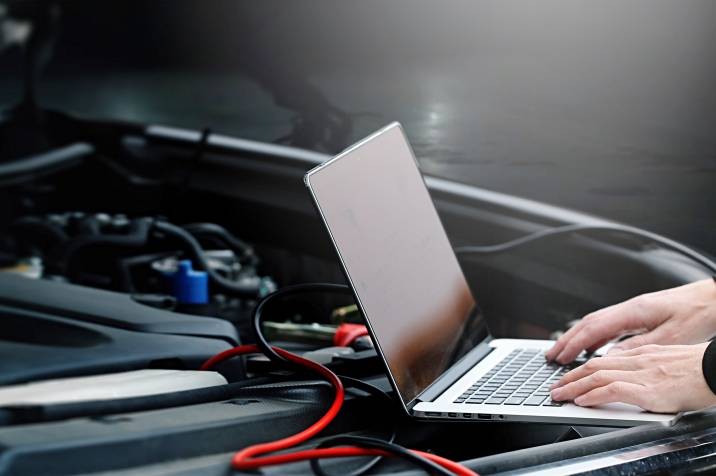It’s a scenario every car owner dreads: the check engine light illuminates on your dashboard. Immediately, questions flood your mind, and chief among them is often, “How much is this going to cost me?” Before you can even address the potential repairs, you might need to figure out what’s wrong in the first place. This is where a car diagnostic test comes in. But how much does a diagnostic cost for your car, and what exactly are you paying for?
The price of a car diagnostic test can vary considerably, generally ranging from $20 to upwards of $400. This broad range is influenced by several factors, including the type of service provider, the complexity of your vehicle, and your geographical location. While a lower price might seem appealing, understanding what you’re getting for your money is crucial. Let’s delve into the details of car diagnostic costs to help you make informed decisions about your vehicle’s health.
What Exactly is a Car Diagnostic Test?
Modern vehicles are sophisticated machines equipped with a network of sensors and onboard computers. These sensors constantly monitor various systems, from the engine and transmission to the braking and emission controls. When these sensors detect an anomaly, it often triggers the check engine light or another warning indicator. A car diagnostic test is essentially a computerized health check for your vehicle. Mechanics use specialized tools and software to communicate with your car’s computer, retrieving stored error codes and data that pinpoint potential issues.
This process is far more efficient than relying solely on manual inspection. Instead of blindly searching for problems, a diagnostic test directs the mechanic to the specific area or system that requires attention. Think of it as a medical check-up for your car, providing valuable insights for targeted repairs.
Decoding a Full Car Diagnostic Test: What’s Included?
A mechanic utilizing a laptop and diagnostic interface to assess a vehicle’s engine. (Source: iStock)
A comprehensive car diagnostic test goes beyond simply reading error codes. It typically involves a thorough scan of your vehicle’s major systems, providing a detailed overview of its operational status. A full diagnostic test should ideally cover:
- Engine Performance: Analyzing engine control systems, fuel delivery, and ignition timing.
- Transmission System: Evaluating gear shifts, fluid pressure, and overall transmission health.
- Braking System (ABS): Checking the anti-lock braking system for sensor malfunctions and hydraulic issues.
- Exhaust and Emissions: Analyzing components like catalytic converters and oxygen sensors for emission control efficiency.
- Fuel System: Assessing fuel pressure, injector performance, and fuel pump functionality.
- Electrical System: Diagnosing issues within the battery, alternator, starter, and wiring harnesses.
- Air Conditioning (AC): Checking refrigerant levels, compressor function, and system leaks.
- Airbag and Safety Systems (SRS): Verifying the functionality of airbags, seatbelt pretensioners, and related sensors.
- Sensors and Computer Systems: Examining the myriad of sensors throughout the vehicle and the central computer (ECU/PCM).
It’s important to understand that a diagnostic test is not a repair itself. It identifies potential problem areas, guiding the mechanic to perform further physical inspections and pinpoint the root cause of the issue. This targeted approach ultimately saves time and can prevent unnecessary repairs.
Car Diagnostic Test Costs: Breaking Down the Price Range
To give you a clearer picture of what you might expect to pay, here’s a breakdown of typical car diagnostic costs:
| Type of Diagnostic Test | Estimated Cost Range | Description |
|---|---|---|
| Basic Code Scan | $20 – $75 | Reading basic OBD-II error codes, often offered at auto parts stores. |
| Mid-Range Diagnostic | $75 – $200 | More in-depth scan, potentially includes some component testing by a mechanic. |
| Comprehensive Diagnostic | $200 – $400+ | Full system scan, advanced testing, often performed at dealerships or specialized shops. |


Note: These are estimated costs and can vary based on location and service provider.
These figures are benchmarks to help you budget. For a precise quote tailored to your vehicle and location, it’s always best to directly consult with a mechanic or service center.
Factors Influencing the Cost of Car Diagnostics
Several factors can affect how much you’ll pay for a car diagnostic test:
1. Location, Location, Location
Just like with any service, geographical location plays a significant role in pricing. Areas with higher costs of living and greater demand for auto repair services tend to have higher diagnostic fees. Conversely, more competitive markets may drive prices down.
2. Mechanic Expertise and Shop Type
The experience and specialization of the mechanic or auto shop greatly influence labor rates, which are a component of diagnostic costs. Highly experienced mechanics with advanced diagnostic equipment, particularly at dealerships or specialized service centers, often command higher fees. Independent shops may offer more competitive pricing, but it’s crucial to ensure they have the necessary expertise and equipment for your vehicle type.
3. Vehicle Make and Model
The complexity of your vehicle is a key determinant of diagnostic costs. Luxury vehicles, high-performance cars, and those with advanced technology often require specialized diagnostic tools and expertise. Diagnosing issues in these vehicles can be more time-consuming and require mechanics with specific training, leading to higher costs. Conversely, diagnostic tests for common, mass-market vehicles are generally more straightforward and may be less expensive.
4. Diagnostic Test Depth
As outlined in the cost table, the type of diagnostic test you opt for directly impacts the price. A basic code scan is naturally cheaper than a comprehensive system analysis. If you’re simply trying to decipher a check engine light, a basic scan might suffice initially. However, for more complex or intermittent issues, a more thorough diagnostic test is often necessary to get to the root of the problem.
When is a Car Diagnostic Test a Smart Investment?
A concerned driver examining their car engine after experiencing performance problems. (Source: iStock)
Investing in a car diagnostic test is often a wise decision in several scenarios:
- Check Engine Light is On: This is the most common trigger. A diagnostic test is the first step to understanding why the light illuminated and preventing potential damage.
- Pre-Purchase Used Car Inspection: Before buying a used vehicle, a diagnostic test can uncover hidden issues that might not be apparent during a visual inspection, saving you from costly surprises down the road.
- Preventative Maintenance: Regular diagnostic checks, as part of a preventative maintenance schedule, can identify minor problems before they escalate into major, expensive repairs.
- Unusual Vehicle Behavior: If you notice changes in your car’s performance, such as strange noises, rough idling, decreased fuel efficiency, or unusual shifting, a diagnostic test can help pinpoint the cause, even if the check engine light isn’t on.
In essence, a car diagnostic test is an investment in informed car care. While there is a cost involved, it provides invaluable information that empowers you and your mechanic to address vehicle issues efficiently and effectively, potentially saving you significant money and hassle in the long run by preventing more extensive damage and repairs. Understanding how much a diagnostic cost for your car might be and what influences that price allows you to budget accordingly and prioritize this essential service for maintaining your vehicle’s health and longevity.
